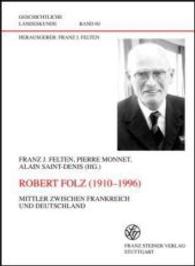- ホーム
- > 洋書
- > 英文書
- > Politics / International Relations
基本説明
Neorealists argue that nations operate on the basis of self-interest defined in terms of power. This book contends that while some leaders have expanded their power, others have sought less power than their comparative strength might have justified, raising hope for a world with less conflict. it features case studies of Austria, Germany, Japan etc.
Full Description
Neorealists argue that all states aim to acquire power and that state cooperation can therefore only be temporary, based on a common opposition to a third country. This view condemns the world to endless conflict for the indefinite future. Based upon careful attention to actual historical outcomes, this book contends that, while some countries and leaders have demonstrated excessive power drives, others have essentially underplayed their power and sought less position and influence than their comparative strength might have justified. Featuring case studies from across the globe, History and Neorealism examines how states have actually acted. The authors conclude that leadership, domestic politics, and the domain (of gain or loss) in which they reside play an important role along with international factors in raising the possibility of a world in which conflict does not remain constant and, though not eliminated, can be progressively reduced.
Contents
1. Theory and international history Ernest R. May, Richard Rosecrance and Zara Steiner; 2. Transformations in power Richard Rosecrance; 3. Domestically driven deviations: internal regimes, leaders, and realism's power line John M. Owen IV; 4. How international institutions affect outcomes Robert O. Keohane and Lisa Martin; 5. Not even for the seventeenth and eighteenth centuries: power and order in the early modern era Paul W. Schroeder; 6. Austria-Hungary and the coming of the First World War Samuel R. Williamson Jr; 7. British decisions for peace and war 1938-1939: the rise and fall of realism Zara Steiner; 8. Realism and risk in 1938: German foreign policy and the Munich crisis Niall Ferguson; 9. Domestic politics, interservice impasse, and Japan's decisions for war Michael Barnhart; 10. Military audacity: Mao Zedong, Liu Shaoqi, and China's adventure in Korea Andrew Kennedy; 11. The United States' underuse of military power Ernest R. May; 12. The overuse of American power Robert S. Litwak; 13. Redrawing the Soviet power line: Gorbachev and the end of the Cold War Deborah Welch Larson and Alexei Shevchenko; 14. Shared sovereignty in the European Union: Germany's economic governance Sherrill Brown Wells and Samuel F. Wells Jr; 15. John Mearsheimer's 'elementary geometry of power': Euclidean moment or an intellectual blind alley? Jonathan Haslam; 16. History and neorealism reconsidered Richard Rosecrance and Zara Steiner.






